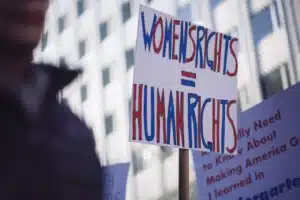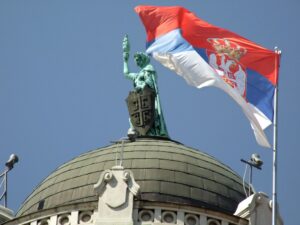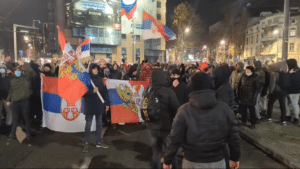What do karate movie with Jackie Chan, the ballet show Swan Lake and a documentary about penguins have in common? On Tuesday the 7th of July, public service Radio Television Serbia did not consider the clashes in front of the parliament worthy of reporting but broadcasted a karate movie with Jackie Chan. During the 1991 coup in Russia, state television aired the ballet show Swan Lake, and in Turkey in 2013, during the violent dissolution of a protest camp in Gezi Park, a TV station close to the government showed a documentary about penguins.
Protests: police brutality on sight
On Tuesday, thousands of people took to the streets of the Serbian capital Belgrade to protest against the return of the curfew in Belgrade due to the rise of corona infections and the increasing pressure on the country’s ineffective healthcare system. The government had imposed strict lockdown measures in the earlier stages of the outbreak but rashly lifted restrictions ahead of parliamentary elections on the 21st of June. Therefore protests were initially triggered by Aleksandar Vucic’s plans to reintroduce lockdown measures but fastly grew into an expression of dissatisfaction with the overall work of the government, manipulation of COVID-19 data and death causes by corona, democratic backsliding, etc. During the first two days, protests were extremely violent with numerous clashes between police and protesters. The police used tear gas, police dogs and calavary, and other units to disperse the protest. Videos that went viral on the social media show police officers hitting people sitting peacefully on a park bench, police beating and stepping on the head of a man lying on the floor and many other disturbing scenes.
Following these videos and other footage, Amnesty International’s Balkans Researcher Jelena Sesar said: “Heavy-handed measures of the kind we have seen over the past two days infringe the rights of those protesting peacefully and will only increase tension and provoke hostility, leading to an escalation of the situation.”
Future perspective
The third day of the protest in Belgrade and other cities in Serbia began peacefully with protestors sitting on the ground. This type of demonstration has been proposed as a “model” on social media. Namely, to differentiate peaceful protestors against violent individuals. However, in the last couple of days, the number of protestors is decreasing. Overall the protests were marked by gatherings of groups of different goals and ideologies. People are protesting against the COVID-19 policy of the government, decay of democracy, inefficient and politically influenced institutions, lack of media freedom, reduced employment opportunities. Still, according to observers, slogans and songs about Kosovo are being heard more frequently, with the presence of icons and religious symbols. Protest without organization, specific demands and achievable goals, like “1 in 5 million”, “Stop the bloody shirts” and many other, are doomed to fail. Additionally, the lack of common demands makes it easier for Serbian authorities to diminish protests, concludes one of the protestors.
Sources: N1, Aljazeera, BBC, DW, Balkan Insight, Radio Free Europe
Photo: Wikimedia



